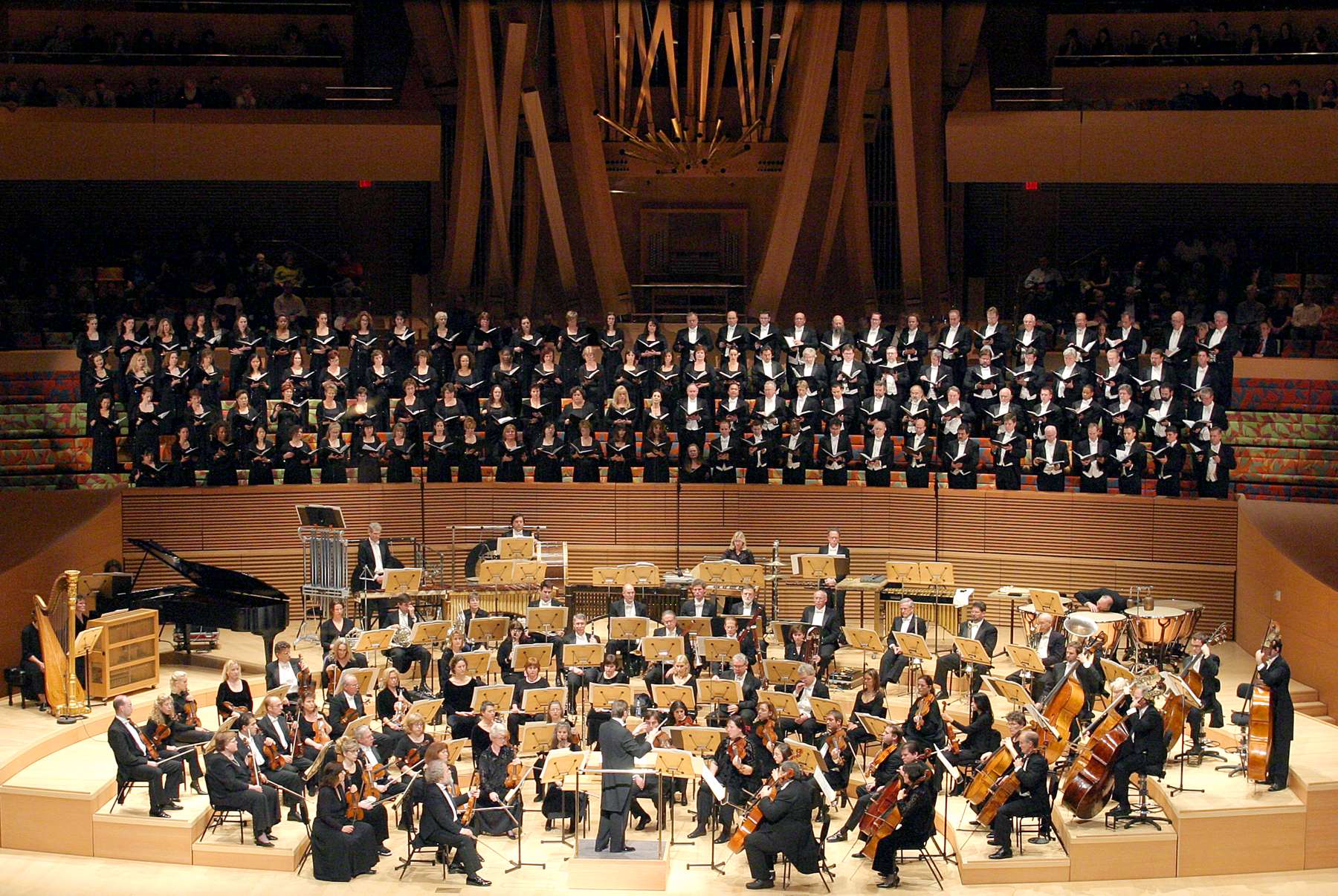|
Back
LA Master Chorale Takes On The Metaphysical Los Angeles
Walt Disney Concert Hall
01/26/2013 - & January 27*, 2013
Peter Lieberson: The World in Flower
Johannes Brahms: Ein Deutsches Requiem, opus 45
Hayden Eberhart (soprano), Kelley O’Connor (mezzo soprano), Brian Mulligan (baritone)
Los Angeles Master Chorale, Grant Gershon (conductor)

LA Master Chorale (© Lee Salem)
Our existence, the afterlife, and the impact of death are powerful themes that demand thoughtful music. The Los Angeles Master Chorale offered two unique perspectives on these themes from two unique composers Sunday evening. The coupling of Brahms’ timeless Ein Deutsches Requiem with a recent piece by the late Peter Lieberson, given its west coast premiere here, is one that may raise an eyebrow at first glance. But Gershon’s readings of both pieces made for a convincing pairing of the two works and outstanding execution by all involved made for a most satisfying concert.
Grant Gershon’s interpretation of the Requiem was as refreshing as it was insightful. Gershon drew inspiration from Brahms’ limpid Liebeslieder waltzes while drawing a clear connection to the choral music of Bach. While the massive third movement fugue, “Der Gerechten Seelen sind in Gottes Hand,” and tender fifth movement “Ihr habt nun Traurigkeit,” seemed to lose some of their emotional gravitas, the rest of the piece benefitted greatly from fleet, but not rushed tempi. The famous fourth movement gained a wonderful tranquility with an easy waltz-like sway. Similarly, the second movement “So seid nun geduldig,” had the same related quality, with the chorale and orchestra soaring through the downbeats to make long, majestic phrases that expanded and contracted with ease. Transitions were unfussy and not protracted. This left the third movement segue, “Ich hoffe auf dich,” a bit hurried but otherwise worked wonderfully.
The Chorale’s strengths were on full display: elasticity of dynamics, crisp diction, and, of course, beautiful, soaring sound. The thundering of the second movement was striking in its pure power that never turned ugly. The Chorale’s outstanding musicianship served them extremely well in navigating the intricate and long fugues at brisk and unrelenting tempi. The beauty of their soaring soprano sound was stunning in their delivery of Brahms’ high pianissimos.
The ad hoc orchestra was the surprise of the evening. The strings played with a warm but nimble sound, particularly the cellos. They executed Gershon’s sweeping shapes all while playing with a keen interest in ensemble. The more exposed wind instruments were a bit tepid at the beginning, but the players warmed up as the piece went on.
Soprano Hayden Eberhart, a late substitute for an ill Yulia van Doren, sang with a slight but cutting soprano sound that was able to be heard above chorus and orchestra. Unfortunately, the graceful length of Brahms’ sensitive phrases eluded her and while her voice lacked the warm maternal solace desired, her angelic appearance made for moving effect.
Baritone Brian Mulligan sang with a youthful but confidant voice. He is a unique talent with natural dramatic instincts. Mulligan occasionally got in to trouble in his upper range, which he tends not to cover, but his sound is consistent, full, and thrilling.
The baritone really got his workout, however, on Peter Lieberson’s The World in Flower. This 45 minute work also featured the talents of a radiant Kelley O’Connor. Written for orchestra, chorus, and two soloists, this unique piece has an impressive cohesiveness with accessible music. In cobbling together 10 different poetic sources, Lieberson was able to create a narrative that is at times dispirited, and at times contemplative, but one that ends with sincere optimism. In fact, Lieberson managed to suffuse the piece with a sense of selflessness this is its most appealing aspect. The only point at which the piece seemed to lose some momentum was, appropriately, the four versus of Neruda’s Oceana, as the undulating patterns of text and music seemed to be endless.
Brian Mulligan sang with a fierce commitment to the text, shining particularly in the tongue-twisting That Nature is a Heraclitean Fire and of the Comfort of the Resurrection by Gerard Manley Hopkins. The beautiful Kelley O’Connor sang with a commanding presence and velvet tone. Her voice is authoritative without being heavy. O’Connor’s delivery of “Owl Woman’s Song,” was performed with vulnerable effectiveness.
As the piece reached its conclusion with the Navajo prayer, it called to mind the altruistic similarities to Brahms’ masterpiece. Selfless purpose behind action, as Lieberson so eloquently conveyed and Brahms so successfully achieved, is the highest culmination of what choral music is. It is that goal that is so often realized at LA Master Chorale concerts and why they make such beautiful music in virtually any genre.
Matthew Richard Martinez
|